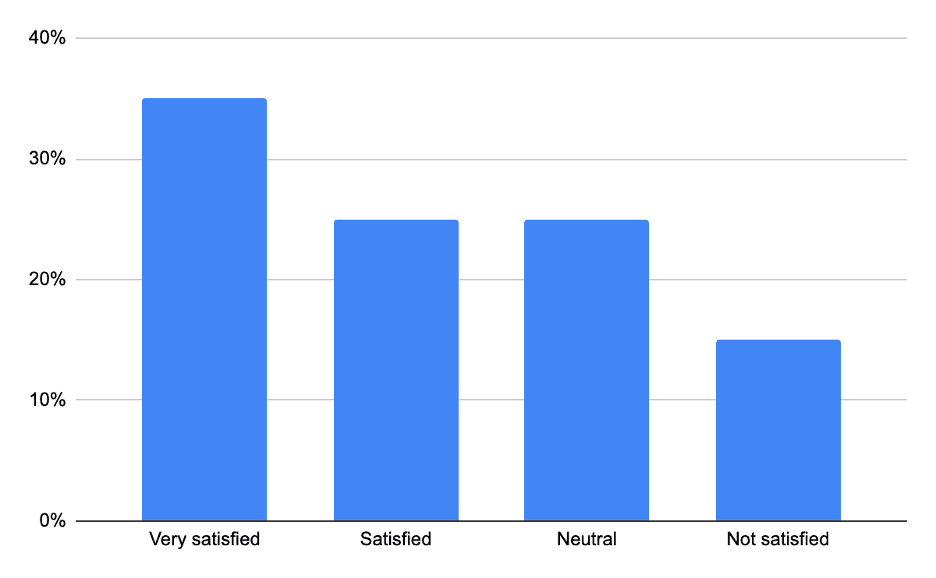Today’s revenue cycles are at a crossroads: hospital and health system leaders are not particularly satisfied with their revenue cycle management solutions.
They’re losing out on reimbursement because of them and they recognize that artificial intelligence could address many of their RCM problems – but very few are implementing AI.
Nearly all (91%) of healthcare executives view revenue cycle management tools as important to the broader organization’s success, yet only 35% are “very satisfied” with their existing RCM solutions.
That’s according to research conducted by healthcare consultancy Sage Growth Partners, which surveyed 95 C-suite and financial leaders. The research found that current RCM tools are generally inefficient and result in missing charges, charge lag and coding errors.
As a result, survey respondents say their organization is leaving as much as 15% of revenue on the table that they should instead be collecting.
Satisfaction with Current RCM Solution
We asked 95 healthcare C-suite and financial leaders about the revenue cycle management tools they are using today.

Source: Where Does it Hurt? The Many Sources of Pain in RCM and the Potential of AI, Ingenious Med
At the same time, our research found that 82% of C-suite and financial healthcare leaders believe artificial intelligence will play an important role in RCM, addressing some of those pressing problems, notably coding, eligibility/benefits verification, denials prevention and management, prior authorization, and charge capture. AI proponents also say the technology will improve cash flow, save money, and increase efficiency.
AI’s criticality in the revenue cycle, in fact, is becoming more widely recognized. The National Bureau of Economic Research estimates that effectively implementing advanced technologies, such as AI, automation and analytics, could save the U.S. between $200 billion and $360 billion of healthcare spending.[1] McKinsey & Company explains that some of that cost reduction could come from administrative burdens, including revenue cycle management.[2]
Yet, according to our research, only 16% of healthcare organizations are currently embracing AI in the revenue cycle, and more than half say they have no plans to implement AI for RCM.
Projected Use of AI in the Revenue Cycle
We asked survey participants when they plan to implement artificial intelligence tools to address revenue cycle pain points.

Source: Where Does it Hurt? The Many Sources of Pain in RCM and the Potential of AI, Ingenious Med
This current state of AI in the revenue cycle presents an opportunity for organizations to step out ahead of competitors by deploying AI, machine learning, automation and analytics to increase reimbursement rates and streamline efficiencies to generate new revenue.
Survey respondents, on average, expect to increase revenue by at least 25% by employing AI in their revenue cycle, and the top expected benefits among those now using AI are better financial health and greater efficiency.
In addition to improving the revenue cycle and the bottom line, AI holds powerful potential to optimize revenue cycle management personnel in health care organizations’ workforces, increase administrative efficiency, and decrease operating costs, according to Moody’s Investors Service. Moody’s notes that AI can also bring down accounts receivable days, summarize data quickly, and free up physicians’ time so they can see more patients.[3]
“Deploying [AI, automation, and analytics] technologies may also reduce clinician burnout and improve patient experience, which are both increasingly important in how healthcare is evolving,” McKinsey wrote.[4]
To learn more about the current state of revenue cycle management and how AI can address the aforementioned problems, read the original research report: Where Does it Hurt? The Many Sources of Pain in RCM and the Potential of AI.
Sources:
- The Potential Impact of Artificial Intelligence on Healthcare Spending, National Bureau of Economic Research
- Setting the Revenue Cycle up for Success in Automation and AI, McKinsey & Company
- Moody’s Investor Services Report October 2023 (proprietary report, link unavailable)
- Setting the Revenue Cycle up for Success in Automation and AI, McKinsey & Company